Fleurs du Mal Magazine


Or see the index
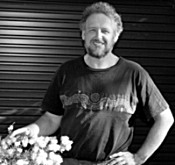
In a dream
In a dream I walked through a forest,
In a great gale, and the wind did not touch
My body, so much as ruffle my hair.
I saw branches, fern fronds hurled past;
I saw a forest giant crash down, its trunk
Shattering, with splinters flying about.
I walked in swirl of dust and yet
My eyes were clear and open.
The wind blew and I did not feel it,
I felt sun and warmth and smelled
A sweet wattle scent. At last I came
To the edge of the scarp, looking down,
And there the wind knocked me, tossing
Me down to be dashed on the rocks
Hundreds of feet below… but for waking
From my dream that was not a dream.
John Leonard
John Leonard lives in Canberra, Australia.
More poetry on website: www.jleonard.net
fleursdumal.nl magazine
More in: Archive K-L, Leonard, John
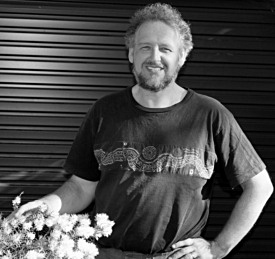
The Enlightenment
‘It happened on July 10, towards dusk,
Right up on that ridge there;
He told me about it himself.
What? Well in Year 1 of course.
To begin with it wasn’t anything
Like you hear now, it was,
He told me, just a confirmation
Of everything he already knew
And trusted. He told me that it felt
As though he had plunged into the current
Of the world and found those familiar things
There.
It was much, much later
That they got the marketing right—
So it isn’t anything like that now,
But it began like that, trust me.’
John Leonard
John Leonard lives in Canberra, Australia.
More poetry on website: www.jleonard.net
fleursdumal.nl magazine
More in: Archive K-L, Leonard, John
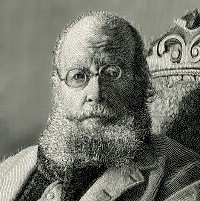
Edward Lear
The Quangle Wangles Hat
On the top of the Crumpetty Tree
The Quangle Wangle sat,
But his face you could not see,
On account of his Beaver Hat.
For his hat was a hundred and two feet wide,
With ribbons and bibbons on every side
And bells, and buttons, and loops, and lace,
So that nobody ever could see the face
Of the Quangle Wangle Quee.
The Quangle Wangle said
To himself on the Crumpetty Tree,
Jam; and jelly; and bread;
Are the best food for me!
But the longer I live on this Crumpetty Tree
The plainer than ever it seems to me
That very few people come this way
And that life on the whole is far from gay!’
Said the Quangle Wangle Quee.
But there came to the Crumpetty Tree,
Mr. and Mrs. Canary;
And they said, Did you ever see
Any spot so charmingly airy?
May we build a nest on your lovely Hat?
Mr. Quangle Wangle, grant us that!
O please let us come and build a nest
Of whatever material suits you best,
Mr. Quangle Wangle Quee!’
And besides, to the Crumetty Tree
Came the Stork, the Duck, and the Owl;
The Snail, and the Bumble-Bee,
The Frog, and the Fimble Fowl;
The Fimble Fowl, with a Corkscrew leg;
And all of them said, We humbly beg,
We may build our homes on your lovely Hat,
Mr. Quangle Wangle, grant us that!
Mr. Quangle Wangle Quee!
And the Golden Grouse came there,
And the Pobble who has no toes,
And the small Olympian bear,
And the Dong with a luminous nose.
And the Blue Babboon, who played the flute,
And the Orient Calf from the Land of Tute,
And the Attery Squash, and the Bisky Bat,
All came and built on the lovely Hat
Of the Quangle Wangle Quee.
And the Quangle Wangle said
To himself on the Crumpetty Tree,
When all these creatures move
What a wonderful noise there’ll be!’
And at night by the light of the Mulberry moon
They danced to the flute of the Blue Babboon,
On the broad green leaves of the Crumpetty Tree,
And all were as happy as happy could be,
With the Quangle Wangle Quee.
Edward Lear (1812 – 1888)
The Quangle Wangles Hat
fleursdumal.nl magazine
More in: Archive K-L, Edward Lear, LIGHT VERSE

D.H.Lawrence
Bei Hennef
The little river twittering in the twilight,
The wan, wondering look of the pale sky,
This is almost bliss.
And everything shut up and gone to sleep,
All the troubles and anxieties and pain
Gone under the twilight.
Only the twilight now, and the soft “Sh!” of the river
That will last for ever.
And at last I know my love for you is here;
I can see it all, it is whole like the twilight,
It is large, so large, I could not see it before,
Because of the little lights and flickers and interruptions,
Troubles, anxieties and pains.
You are the call and I am the answer,
You are the wish, and I the fulfilment,
You are the night, and I the day.
What else – it is perfect enough.
It is perfectly complete,
You and I,
What more-?
Strange, how we suffer in spite of this.
D.H.Lawrence (1883 – 1930)
Bei Hennef
fleursdumal.nl magazine
More in: Archive K-L, D.H. Lawrence, Lawrence, D.H.
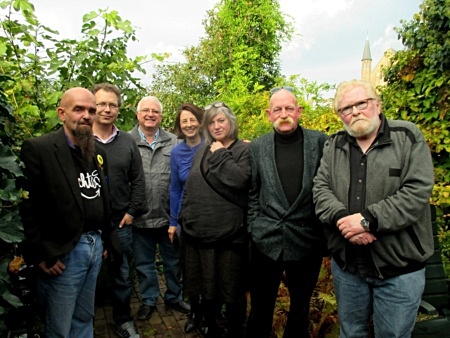
Vertaling van het gedicht Theater van Jef van Kempen in het Zuid-Afrikaans door Bernard Odendaal.
Eerder gepubliceerd door Carina van der Walt in: Versindaba – ‘n Kollektiewe weblog vir die Afrikaanse digkuns –
http://versindaba.co.za/2016/03/31/carina-van-der-walt-jeroen-bosch-se-skilderye/
Theater
Stel je voor: een toneel van dolende nachtvogels
boven een doorweekte woestijn, in een duister
hospitaal voor koortsige landlopers.
Stel je voor: een opera van rondborstige gedrochten,
verwekt in een glazen stolp, amechtig lispelend,
op kromme stelten strompelend, in een vuile
sneeuwjacht van de diepe winter.
Eind goed al goed vonden de trage doden hun draai
en bestegen, tegen de keer, het paard van Troje
en maakten hun dromen waar.
Jef van Kempen
(Uit de bundel ‘Laatste Bedrijf’ 2012)
Teater
Stel jou voor: ’n toneel van dolende nagvoëls
bokant ’n deurweekte woestyn, in ’n donker
hospitaal vir koorsige boemelaars.
Stel jou voor: ’n opera van rondborstige gedrogte
verwek onder ’n glasstolp, uitasem lispelend,
op krom stelte strompelend, morsig aan die
jag in die diepwintersneeuw.
Einde goed alles goed kry die trae dooies hul draai
en bestyg, dwarstrekkerig, die perd van Troje
en maak hulle drome waar.
Vertaling Bernard Odendaal (2016)
FOTO: v.l.n.r. Martin Beversluis, Desmond Painter, Bernard Odendaal, Carina van der Walt, Annelie David, Bert Bevers en Jef van Kempen (foto Nel van Kempen 2015)
fleursdumal.nl magazine
More in: Archive K-L, Archive O-P, Bernard Odendaal, Bevers, Bert, Beversluis, Martin, Carina van der Walt, Jef van Kempen, Kempen, Jef van, Literaire Salon in 't Wevershuisje, TRANSLATION ARCHIVE

D.H. Lawrence
Excursion
I wonder, can the night go by;
Can this shot arrow of travel fly
Shaft-golden with light, sheer into the sky
Of a dawned to-morrow,
Without ever sleep delivering us
From each other, or loosing the dolorous
Unfruitful sorrow!
What is it then that you can see
That at the window endlessly
You watch the red sparks whirl and flee
And the night look through?
Your presence peering lonelily there
Oppresses me so, I can hardly bear
To share the train with you.
You hurt my heart-beats’ privacy;
I wish I could put you away from me;
I suffocate in this intimacy,
For all that I love you;
How I have longed for this night in the train,
Yet now every fibre of me cries in pain
To God to remove you.
But surely my soul’s best dream is still
That one night pouring down shall swill
Us away in an utter sleep, until
We are one, smooth-rounded.
Yet closely bitten in to me
Is this armour of stiff reluctancy
That keeps me impounded.
So, dear love, when another night
Pours on us, lift your fingers white
And strip me naked, touch me light,
Light, light all over.
For I ache most earnestly for your touch,
Yet I cannot move, however much
I would be your lover.
Night after night with a blemish of day
Unblown and unblossomed has withered away;
Come another night, come a new night, say
Will you pluck me apart?
Will you open the amorous, aching bud
Of my body, and loose the burning flood
That would leap to you from my heart?
D.H.Lawrence (1883 – 1930)
Excursion
fleursdumal.nl magazine
More in: Archive K-L, D.H. Lawrence, Lawrence, D.H.

Edward Lear
How pleasant to know Mr. Lear
How pleasant to know Mr. Lear,
Who has written such volumes of stuff.
Some think him ill-tempered and queer,
But a few find him pleasant enough.
His mind is concrete and fastidious,
His nose is remarkably big;
His visage is more or less hideous,
His beard it resembles a wig.
He has ears, and two eyes, and ten fingers,
(Leastways if you reckon two thumbs);
He used to be one of the singers,
But now he is one of the dumbs.
He sits in a beautiful parlour,
With hundreds of books on the wall;
He drinks a great deal of marsala,
But never gets tipsy at all.
He has many friends, laymen and clerical,
Old Foss is the name of his cat;
His body is perfectly spherical,
He weareth a runcible hat.
When he walks in waterproof white,
The children run after him so!
Calling out, “He’s gone out in his night-
Gown, that crazy old Englishman, oh!”
He weeps by the side of the ocean,
He weeps on the top of the hill;
He purchases pancakes and lotion,
And chocolate shrimps from the mill.
He reads, but he does not speak, Spanish,
He cannot abide ginger beer;
Ere the days of his pilgrimage vanish,
How pleasant to know Mr. Lear!
Edward Lear (1812 – 1888)
How pleasant to know Mr. Lear
fleursdumal.nl magazine
More in: Archive K-L, Edward Lear, LIGHT VERSE

What must be said
You cannot believe it possible to say
What must be said—words being
So few and dry, catchwords,
‘Your journey, our worldview’,
So hostile to living intent.
But you find the words without searching,
As at need, and they have a beauty,
As, once in a while, the desert,
At the touch of rain, is starred
Endlessly with small white flowers.
John Leonard
John Leonard Writer’s CV:
1965: Born, Cambridge, UK
1984-87: Read English at Oxford University, UK
1990: Unlove (poems) published in UK
1991: Emigrated to Australia
1991-94: PhD studies at University of Queensland; ‘Lyric and Modernity’ awarded 1995
1997: 100 Elegies for Modernity (poems, Sydney, Hale and Iremonger)
2003: Jesus in Kashmir (poems, Canberra, Proensa)
2003-07: Poetry Editor, Overland (Melbourne)
2009: Poem published in Best Australian Poetry 2009 (Melbourne, Black Inc)
2010: Braided Lands (poems, Ginninderra Press, Adelaide)
2010: The Way of Poetry (criticism linking poetry and Daoism; Three Pines Press, Dunedin, Florida) (see www.threepinespress.com, under ‘Dao Today’ tab)
2014: A Spell, A Charm (poems, Melbourne, Hybrid Publishers
Poetry widely published in quality journals, eg Overland, Meanjin, Island
Poems translated into French, Spanish, Croatian and Chinese and published in those versions, eg When the Moon Is Swimming Naked: Australasian Poetry for the Chinese Youngster, Ed Kit Kelen and Mark Carthew, ASM Poetry, Association of Stories in Macao, 2013 (8 poems), http://poetassigloveintiuno.blogspot.com.au/2012/07/7271-john-leonard.html (5 poems)&c
Poems published in anthologies eg The Best Australian Poems 2009, (Melbourne, Black Inc), The Turnrow Anthology of Contemporary Australian Poetry 2014, Canberra Poets Anthology 2014
Website: www.jleonard.net
february 2017
magazine fleursdumal.nl
More in: Archive K-L, Leonard, John
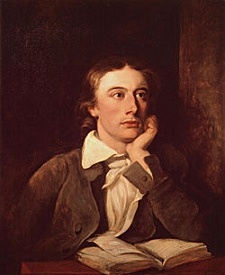
John Keats
Ode On A Grecian Urn
Thou still unravish’d bride of quietness,
Thou foster-child of silence and slow time,
Sylvan historian, who canst thus express
A flowery tale more sweetly than our rhyme:
What leaf-fring’d legend haunts about thy shape
Of deities or mortals, or of both,
In Tempe or the dales of Arcady?
What men or gods are these? What maidens loth?
What mad pursuit? What struggle to escape?
What pipes and timbrels? What wild ecstasy?
Heard melodies are sweet, but those unheard
Are sweeter; therefore, ye soft pipes, play on;
Not to the sensual ear, but, more endear’d,
Pipe to the spirit ditties of no tone:
Fair youth, beneath the trees, thou canst not leave
Thy song, nor ever can those trees be bare;
Bold Lover, never, never canst thou kiss,
Though winning near the goal yet, do not grieve;
She cannot fade, though thou hast not thy bliss,
For ever wilt thou love, and she be fair!
Ah, happy, happy boughs! that cannot shed
Your leaves, nor ever bid the Spring adieu;
And, happy melodist, unwearied,
For ever piping songs for ever new;
More happy love! more happy, happy love!
For ever warm and still to be enjoy’d,
For ever panting, and for ever young;
All breathing human passion far above,
That leaves a heart high-sorrowful and cloy’d,
A burning forehead, and a parching tongue.
Who are these coming to the sacrifice?
To what green altar, O mysterious priest,
Lead’st thou that heifer lowing at the skies,
And all her silken flanks with garlands drest?
What little town by river or sea shore,
Or mountain-built with peaceful citadel,
Is emptied of this folk, this pious morn?
And, little town, thy streets for evermore
Will silent be; and not a soul to tell
Why thou art desolate, can e’er return.
O Attic shape! Fair attitude! with brede
Of marble men and maidens overwrought,
With forest branches and the trodden weed;
Thou, silent form, dost tease us out of thought
As doth eternity: Cold Pastoral!
When old age shall this generation waste,
Thou shalt remain, in midst of other woe
Than ours, a friend to man, to whom thou say’st,
“Beauty is truth, truth beauty,–that is all
Ye know on earth, and all ye need to know.”
John Keats (1795 – 1821)
Ode On A Grecian Urn
fleursdumal.nl magazine
More in: Archive K-L, Keats, John
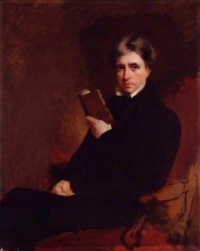
Leigh Hunt
(1784 – 1859)
On Receiving A Crown Of Ivy From John Keats
A Crown of of ivy! I submit my head
To the young hand that gives it, –young, ’tis true,
But with a right, for ’tis a poet’s too.
How pleasant the leaves feel! and how they spread
With their broad angles, like a nodding shed
Over both eyes! and how complete and new,
As on my hand I lean, to feel them strew
My sense with freshness, — Fancy’s rustling bed!
Tress-tossing girls, with smell of flowers and grapes
Come dancing by, and downward piping cheeks,
And up-thrown cymbals, and Silenus old
Lumpishly borne, and many trampling shapes,–
And lastly, with his bright eyes on her bent,
Bacchus, — whose bride has of his hand fast hold.
Leigh Hunt poetry
fleursdumal.nl magazine
More in: Archive G-H, Archive K-L, Hunt, Leigh, Keats, John
 Letter to Leigh Hunt by John Keats
Letter to Leigh Hunt by John Keats
Margate, May 10th, 1817
My dear Hunt
The little Gentleman that sometimes lurks in a gossips bowl ought to have come in very likeness of a coasted crab and choaked me outright for not having answered your Letter ere this – however you must not suppose that I was in Town to receive it, no, it followed me to the isle of Wight and I got it just as I was going to pack up for Margate, for reasons which you anon shall hear. On arriving at this treeless affair I wrote to my Brother George to request C. C. C. to do the thing you wot of respecting Rimini; and George tells me he has undertaken it with great Pleasure; so I hope there has been an understanding between you for many Proofs – – C. C. C. is well acquainted with Bensley. Now why did you not send the Key of your Cupboard which I know was full of Papers? We would have lock’d them all in a trunk together with those you told me to destroy; which indeed I did not do for fear of demolishing Receipts. There not being a more unpleasant thing in the world (saving a thousand and one others) than to pay a Bill twice. Mind you – old Wood’s a very Varmant – sharded in Covetousness – And now I am upon a horrid subject – what a horrid one you were upon last sunday and well you handled it. The last Examiner was a Battering Ram against Christianity – Blasphemy – Tertullian – Erasmus – Sr. Philip Sidney. And then the dreadful Petzelians and their expiation by Blood – and do Christians shudder at the same thing in a Newspaper which they attribute to their God in its most aggravated form? What is to be the end of this? I must mention Hazlitt’s Southey – O that he had left out the grey hairs! Or that they had been in any other Paper not concluding with such a Thunderclap – that sentence about making a Page of the feeling of a whole life appears to me like a Whale’s back in the Sea of Prose. I ought to have said a word on Shakspeare’s Chrisitanity – there are two, which I have not looked over with you, touching the thing: the one for, the other against. That in favour is in Measure for Measure Act 2. S. 2 Isab. Alas! alas!
Why all the Souls that were, were forfeit once And he that might the vantage best have took, Found out the Remedy –
That against is in Twelfth Night. Act 3. S. 2. Maria – for there is no Christian, that means to be saved by believing rightly, can ever believe such impossible Passages of grossness! Before I come to the Nymphs I must get through all disagreeables – I went to the Isle of Wight – thought so much about Poetry so long together that I could not get to sleep at night – and moreover, I know not how it was, I could not get wholesome food – By this means in a Week or so I became not over capable in my upper Stories, and set off pell mell for Margate, at least 150 Miles – because forsooth I fancied that I should like my old Lodging here, and could contrive to do without Trees. Another thing I was too much in Solitude, and consequently was obliged to be in continual burning of thought as an only resource. However Tom is with me at present and we are very comfortable. We intend though to get among some Trees. How have you got on among them? How are the Nymphs? I suppose they have led you a fine dance – Where are you now. In Judea, Cappadocia, or the Parts of Lybia about Cyrene, Strangers from “Heaven, Hues and Prototypes. I wager you have given several new turns to the old saying “Now the Maid was fair and pleasant to look on” as well as made a little variation in “once upon a time” perhaps too you have rather varied “thus endeth the first Lesson” I hope you have made a Horseshoebusiness of – “unsuperfluous lift” “faint Bowers” and fibrous roots. I vow that I have been down in the Mouth lately at this Work. These last two days however I have felt more confident – I have asked myself so often why I should be a Poet more than other Men, – seeing how great a thing it is, – how great things are to be gained by it – What a thing to be in the Mouth of Fame – that at last the Idea has grown so monstrously beyond my seeming Power of attainment that the other day I nearly consented with myself to drop into a Phæton – yet ’tis a disgrace to fail even in a huge attempt, and at this moment I drive the thought from me. I began my Poem about a Fortnight since and have done some every day except travelling ones – Perhaps I may have done a good deal for the time but it appears such a Pin’s Point to me that I will not coppy any out. When I consider that so many of these Pin points go to form a Bodkin point (God send I end not my Life with a bare Bodkin, in its modern sense) and that it requires a thousand and more unpleasant (it may come among the thousand and one) than to be so journeying and miss the Goal at last. But I intend to whistle all these cogitations into the Sea where I hope they will breed Storms violent enough to block up all exit from Russia. Does Shelley go on telling strange Stories of the Death of Kings? Tell him there are strange Stories of the death of Poets – some have died before they were conceived “how do you make that out Master Vellum”. Does Mrs. S. cut Bread and Butter as neatly as ever? Tell her to procure some fatal Scissors and cut the thread of Life of all to be disappointed Poets. Does Mrs Hunt tear linen in half as straight as ever? Tell her to tear from the book of Life all blank Leaves. Remember me to them all – to Miss Kent and the little ones all.
Your sincere friend
John Keats alias Junkets
Letter to Leigh Hunt (1784 – 1859) by John Keats (1795 – 1821)
fleursdumal.nl magazine
More in: Archive G-H, Archive K-L, Hunt, Leigh, Keats, John
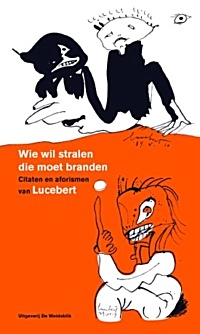 ‘Alles van waarde is weerloos’, staat er in grote neonletters op het dak van een Nederlandse verzekeraar. Het is een tot aforisme, zelfs tot spreekwoord geworden versregel van Lucebert.
‘Alles van waarde is weerloos’, staat er in grote neonletters op het dak van een Nederlandse verzekeraar. Het is een tot aforisme, zelfs tot spreekwoord geworden versregel van Lucebert.
Lucebert werd en wordt weleens getypeerd als een ontoegankelijk dichter. Des te opmerkelijker is het hoeveel sporen hij heeft achtergelaten in de omgangstaal. In tal van niet-literaire teksten wordt onnadrukkelijk of juist expliciet verwezen naar passages uit zijn gedichten: ‘de ruimte van het volledig leven’, ‘omroeper van oproer’, ‘dichters van fluweel’, ‘het proefondervindelijk gedicht’, ‘de blote kont van de kunst’, ‘ritselende revolutie’, ‘overal zanikt bagger’ – het is maar een greep uit het dichterlijk erfgoed van Lucebert dat zich in de omgangstaal heeft genesteld.
In Wie wil stralen die moet branden zijn deze citaten en aforismen uit het oeuvre van Lucebert bijeengebracht door Ton den Boon (hoofdredacteur van de Dikke Van Dale), die daarbij een inleiding schreef over de invloed van Lucebert op de Nederlandse taal. Het boekje is verlucht met niet eerder gepubliceerde tekeningen van Lucebert.
Wie wil stralen die moet branden.
Citaten en aforismen van Lucebert – Lucebert, Ton den Boon
Auteurs: Lucebert, Ton den Boon
Vormgeving: Huug Schipper, Studio Tint
Omvang: 96 pagina’s
Afwerking: paperback
Formaat: 12 x 20 cm
ISBN: 9789077767658
€ 7,50
Verschijning: september 2016, De Weideblik
De Weideblik is een middelgrote uitgeverij, gespecialiseerd in uitgaven op het gebied van de beeldende kunst. Veel van onze boeken worden gemaakt in nauwe samenwerking met een kunstenaar (of diens nazaten) en/of een tentoonstellingsinstelling.
# Meer info website Uitgeverij Weideblik
fleursdumal.nl magazine
More in: - Book News, - Bookstores, Archive K-L, Lucebert, Lucebert
Thank you for reading Fleurs du Mal - magazine for art & literature